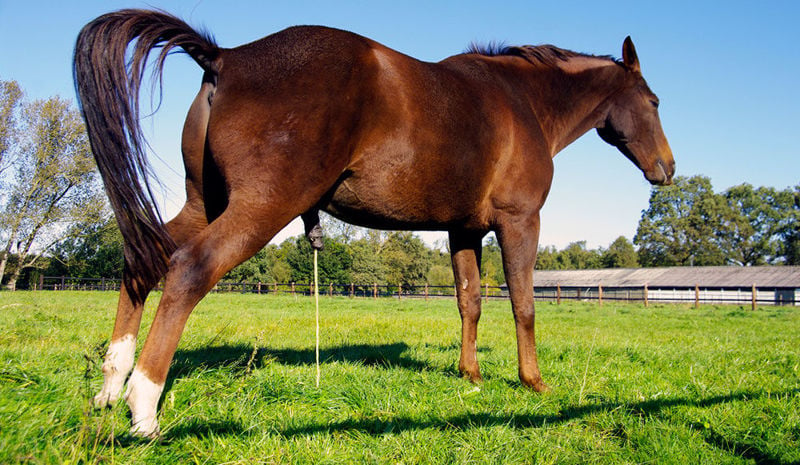On average horses produce around 7 – 9 litres of urine per day, and just like humans, a lot can be learned about the health of the animal from monitoring it.
Sight
Normal horse urine is yellow to near colourless but there are variations in what you may see when your horse is urinating. Pale and nearly odourless urine is a sign of a well hydrated horse, however horses with restricted access to water or those that have been sweating a lot due to work or hot weather are likely to have more concentrated urine which will be dark yellow and often smelly. This is still considered ‘normal’ and is not cause for concern as urine will become paler and less odorous once the horses starts to rehydrate.
Some horses will be seen to pass cloudy or creamy urine, and whilst this may seem unusual, rest assured it is generally harmless. Creamy coloured urine that appears at the start or end of the stream or occasionally throughout is due to the presence of calcium carbonate crystals in the urine. These calcium carbonate crystals are quite normal in horses, and they sit within the bladder. Unlike in dogs and cats, urinary crystals do not pose a problem in horses. Excessive calcium is absorbed from the intestines and is excreted in the urine giving the cloudy appearance.
You may also see bubbly or foamy urine, which again is normal and is associated with calcium carbonate crystals. Bubbly urine contains mucus which acts as a lubricant to prevent calcium carbonate crystals from turning into stones.
Smell
Smelly urine is also fairly normal for horses. The more protein a horse has in its diet, higher levels of urea and ammonia are excreted via urine. The ammonia smell that is usually associated with the stabled horse is generally down to the protein content of the horse’s diet. If your horse has smelly urine, it doesn’t necessarily mean that they are getting too much protein in the diet so don’t rush to make changes unnecessarily before consulting a nutritionist.
When to seek advice
Things that are not normal when it comes to urine are less than usual urination and very dark colouring. Little and often urination which may or may not contain blood can be a sign of cystitis, a common urinary tract condition in mares due to their shorter urethra which allows infection to access the bladder more easily.
Very dark urine is seen in horses that suffer from muscle disorders such as Tying-up. During an episode of Tying-up, there is a change to the permeability of the muscle cell membrane which causes large quantities of protein to be voided in the blood and excreted through urine.
Day to Day care
Although it may seem unpleasant to analyse your horse’s urine, doing so can tell you at lot about their healthy and hydration status and allow you to make changes if needed to avoid some of the ‘not-normal’ conditions that can be associated with changes in the horse’s urine.
Herbs that can help to support a health urinary tract include Dandelion and Nettle. Dandelion optimises the health of the urinary tract and can help to encourage urination. Nettle support fluid regulation within the body, optimising urinary tract health.
For any advice or questions you may have, please don't hestiate to reach out to our expert nutrition team. You can call 0800 585525 Monday-Friday 8:30am-5:00pm. Email [email protected], or send us a DM on social media.


